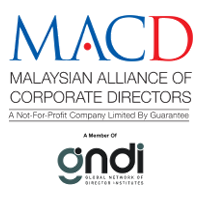In the first edition of The Star’s ESG pullout on 29 April 2022, Malaysian Alliance of Corporate Directors (MACD) President and Co-founder, Paul W. Chan pointed out that the trending expectation of investors, and the investee companies is in the allocation of funds into socially responsible investments.
He pointed out that while the ESG concerns of specific investors vary, all need comprehensive information to help them make investment decisions.
“They want insights into the company’s posture on ESG topics and the associated issues and risks, as well as plans and responses. Institutional investors have, for example, become highly concerned with global climate change issues,” he said.
“As the scope of these issues continues to expand, so do the board’s oversight duties and fiduciary responsibilities,” said Chan, a chartered accountant who had served as the president of ACCA Malaysia and Malaysian Institute of Chartered Secretaries and Administrators (ICSA), and secretary-general of Malaysian Institute of Corporate Governance (MICG). “With respect to increasing responsibilities of boards of Malaysian public-listed companies to appropriately discharge their fiduciary duties, it is imperative for boards to embrace, enhance improve and advance their competencies in ESG oversight,” said Chan, who is also vice president (1) of the Federation of Public Listed Companies (FPLC).
Global institutional asset managers are very critical and vocal on such ESG issues nowadays. “Non compliance of ESG issues can be very damaging to companies especially those in the manufacturing and export sectors. As global market players, the earnings and stock prices could be adversely affected when global investors make negative statements against the company,” said Chan.
Chan also explained that more Malaysian businesses are moving towards adopting Integrated Reporting (IR) as a more comprehensive corporate reporting framework to enhance their communication with key stakeholders and to attract capital.
In the 2017 Malaysian Code on Corporate Governance (MCCG 2017) report, the Securities Commission (SC) had encouraged large companies to adopt Integrated Reporting (IR) based on a globally recognised framework.
Large companies are (as previously defined in Sustainability Reporting) those on the FTSE Bursa Malaysia with market capitalisation of RM2bil and above, at the start of the companies’ financial year.
IR is the main report from which all other detailed information flows, such as annual financial statements, governance and sustainability reports.
It is a concise communication about how a company’s strategy, performance, governance and prospects lead to long-term sustainable integrated value creation. “IR improves the quality of information available to investors and promotes greater transparency and accountability on the part of the company,” the SC noted.
Meanwhile, at COP26, (November 2021 United Nations climate change conference), the International Sustainability Standard Board (ISSB) was established to develop a comprehensive global baseline or sustainability disclosures for capital markets.
The IFRS (International Financial Reporting Standard) Foundation and VRF (Value Reporting Foundation – a merged entity of International Integrated reporting Council [IIRC] and Sustainability Accounting Standard Board [SASB]) were tasked to develop the global baseline standard.
“The target is to come up with a framework and standards by June 2022. As IFRS has been adopted by most of the global capital markets, it is expected the ISSB, when formalised, would eventually be adopted likewise,” said Chan, who is also the Global Ambassador of IIRC, United Kingdom.
Chan said in the future, financial auditors will need to “pull out all the stops” to go beyond financial reporting.
“What is in discussion, is potentially a new generation of ESG auditors that could well emerge. They may not necessarily be financial professionals – they could be engineers or other professionals with skill sets in complex process audits.
“It is appropriate and timely that stakeholders and institutions of higher learning invest resources in research and development, in the new corporate reporting framework to serve the growing corporate market.”
“There is a significant paradigm shift in corporate reporting beyond the traditional financials to encompass the intangibles and non-financials, such as ESG, United Nation’s Social Development Goals (SDG) and climate change. One thing is certain, the fiduciary duties and responsibilities of the board have definitely expanded,” said Chan.
Regarding boardroom diversity, Chan said in an era of rapid technology changes and digital-powered businesses, there is a need to focus more on “digital skill sets and experience diversity” in boardrooms. “Things are changing so rapidly that technology is enroaching into every space in industries,” he said.
Source: The Star ESG


